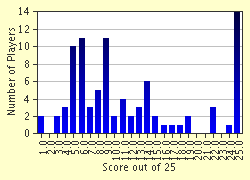Quiz Answer Key and Fun Facts
1. John Donne is, in some sense, the originator of metaphysical poetry. But who is most closely associated with the "founding" of neoclassical poetry?
2. Which of the following is not generally considered to be a neoclassical poet?
3. Which of the following is not a common feature of neoclassical poetry?
4. Neoclassicists tended to view poetry as the result of genius overflowing from the mind out onto the page. They also considered poetry to be an expression of the individual, inner self.
5. Most neoclassical poets viewed the world in terms of a strictly ordered hierarchy. What was this hierarchy called?
6. He wrote both religious and secular poetry. One of his poems urged virgins to make the most of their time.
7. Why didn't Alexander Pope attend an English university?
8. Alexander Pope coined many a modern day cliché. Which of the following did not originate with him?
9. Robert Herrick's poem "The New Year's Gift" celebrates Christ's:
10. John Dryden wrote "Absalom and Achitophel." Who was Achitophel, historically speaking?
11. Who did Dryden use Absalom to represent, allegorically, in his satire "Absalom and Achitophel"?
12. Complete this famous quote by John Dryden: "Who think too little, and who talk too ____"
13. Who wrote "No farther seek his merits to disclose, / Or draw his frailties from their dread abode, / (There they alike in trembling hope repose) / The bosom of his Father and his God."
14. "But Shadwell never deviates into sense." This clever insult comes from what mock heroic by John Dryden?
15. You've probably heard of "damning with faint praise." But where did the phrase originate?
16. In his "Essay on Criticism", Pope bemoans the predictability of much poetry. Complete this quote: "While they ring round the same unvaried chimes, / With sure returns of still expected rhymes. / Where'er you find 'the cooling western breeze' / In the next line, it 'whispers through _____'."
17. What Pope poem begins, "In these deep solitudes and awful cells, / Where heav'nly-pensive contemplation dwells, / And ever-musing melancholy reigns; / What means this tumult in a vestal's veins?"
18. Pope made money by selling subscriptions to his translation of this classical epic.
19. This famous neoclassical poet wrote on profound themes such as death, but he also had a lighter side. He once wrote an ode to a cat drowned in a tub of gold fishes.
20. His "To Penshurst" is considered to be one of the primary texts of the neoclassical movement.
21. Sir John Denham commemorated this poet, referring to him as "Old Chaucer" who, "like the morning star", descends "to the shades," so that "Darkness again the Age invades."
22. Scholars often argue that Alexander Pope's "An Essay on Man" presents the worldview of a Deist. But in this poem, John Dryden explicitly disputes Deism.
23. Fill in the missing word from Pope's "An Essay on Man": "If man alone engross not Heav'n's high care, / Alone made perfect here, immortal there: / Snatch from his hand the balance and the rod,
/ Rejudge his justice, be the ___ of ___."
24. What mock epic begins: "What dire offence from am'rous causes springs, / What mighty contests rise from trivial things"?
25. The hero of this mock epic is Lewis Theobald. The poet describes him as reclining on the lap of his mother, beneath whose throne "Science groans in chains, / And Wit dreads exile, penalties, and pains."
Source: Author
skylarb
This quiz was reviewed by FunTrivia editor
bullymom before going online.
Any errors found in FunTrivia content are routinely corrected through our feedback system.

